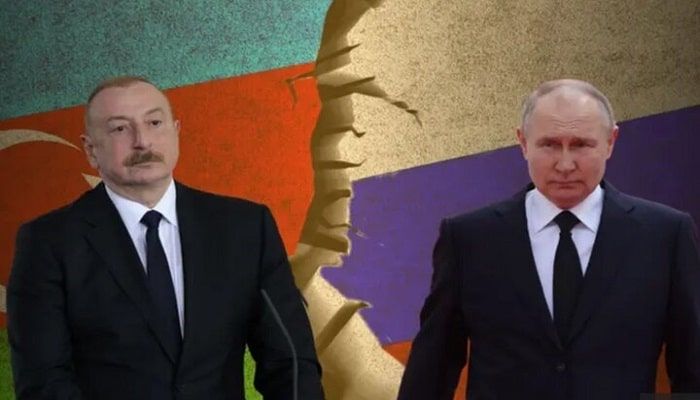PNN – The crash of a passenger plane, diplomatic crisis, and geopolitical alignments have strained relations between Russia and the Republic of Azerbaijan, a stage that has thrown the future of bilateral relations and the Caucasus region into uncertainty.
In recent years, the South Caucasus has once again become a scene of geopolitical competition; a region that has always been at the intersection of the interests of great powers, and historical conflicts and ethnic conflicts have provided the basis for new tensions.
Meanwhile, relations between the Republic of Azerbaijan and Russia, which were previously considered “strategic partners,” have entered an unprecedented stage of tension and open confrontation. From diplomatic disputes to media clashes; from military incidents to retaliatory security clashes, all of them indicate a deep and widening rift in relations between the two countries.
Read more:
77 years of living under the constant shadow of war and mental exhaustion.
Historical and structural contexts of the disputes between Russia and Baku
Relations between Russia and the Republic of Azerbaijan are rooted in the complex history of the Caucasus, where the Russian Empire, after the Golestan and Turkmenchay Wars in the early 19th century, annexed the northern lands of Iran and placed present-day Azerbaijan under its direct rule. This annexation was the beginning of military, political, and cultural tension in the region. During the Soviet era, Azerbaijan, as a socialist republic, became one of the key points of oil and energy supplies for Moscow. Some of the dissatisfactions that developed during this period led to the emergence of independence and nationalist movements after the collapse of the Soviet Union.
In the early years of independence, the First Karabakh War between Baku and Yerevan further strained relations with Moscow, as Russia, by providing weapons and logistical support to Armenia, effectively played into Azerbaijan’s hands, and this strengthened Baku’s structural distrust of Russia’s role in the Caucasus.
Developments after the Second Karabakh War in 2020 also deepened this historical rupture. Although Russia appeared as a peace mediator and sent its peacekeeping forces to Karabakh, from Baku’s perspective, the Russians’ passive behavior towards the blockade of the region and their inability to prevent Azerbaijan from fully taking control of Karabakh in 2023 was a sign of Moscow’s declining credibility and effectiveness in the eyes of Baku’s leaders. This situation led to a strengthening of the Republic of Azerbaijan’s desire to reduce its strategic dependence on Russia and seek new partners, including Türkiye and the Zionist regime.
A new season of tensions: from air disaster to geopolitical battle
Relations between Russia and the Republic of Azerbaijan have entered a new chapter of open and deep tensions in recent months; tensions that have gone beyond traditional diplomatic differences to security, media, and geopolitical dimensions, casting the future of relations between the two countries into a haze of uncertainty.
The starting point of this crisis can be considered the fatal crash of an Embraer 190 passenger plane operated by Azul Airlines, which occurred on December 25 near the city of Aktau, Kazakhstan, and resulted in the deaths of 38 people, including 7 Russian citizens. The plane was carrying 67 passengers, most of whom were Azerbaijani citizens, en route from Baku to Grozny.
Azerbaijan blames Russian air defense systems for the downing of the plane, a matter for which Moscow has not yet officially accepted responsibility. The incident, which was described in Baku as “Moscow’s blatant indifference to the lives of Azerbaijani citizens,” has fanned the flames of historic anger and distrust, and plunged relations between the two countries into a new crisis.
From the perspective of observers, beyond these apparent crises, Azerbaijan’s foreign policy is clearly changing course. Baku’s increasing proximity to Western and regional blocs such as Turkey, the Zionist regime, and Ukraine indicates the country’s efforts to gradually withdraw from Russia’s historical sphere of influence and redefine its geopolitical position.
In addition to all of these, the intense media and cultural confrontation between the two countries has practically destroyed the last traditional diplomatic bridges. While Russia accuses Baku of creating instability in the Caucasus, Azerbaijan accuses Moscow of ignoring the dignity and rights of its citizens and seeks to completely reduce Russia’s influence on its economic, political, and cultural structures.
The sum of these events, from the air disaster to the media war and geopolitical alignments, is the beginning of a new chapter of structural tensions between Baku and Moscow; tensions that could fundamentally change not only the future of relations between the two countries, but also the balance of power in the South Caucasus.
Read more:
US State Department approves sale of missile system to Egypt.
From strategic competition to crisis management; the ambiguous outlook for Moscow-Baku relations
The prospect of tensions between Russia and the Republic of Azerbaijan must be analyzed within the context of a complex geopolitical conflict; a crisis that shapes not merely emotional reactions, but also the interests and strategic considerations of the two actors.
In recent years, the Republic of Azerbaijan has attempted to use the space created by the Ukrainian war to redefine its position in regional and trans-regional equations and break free from Moscow’s geopolitical monopoly. The rapprochement with Türkiye and the Israeli regime, energy cooperation with the European Union, and open relations with Ukraine are signs of this gradual change of direction.
Baku is now trying to distance itself from its traditional dependence on Russia as an independent regional actor with a multilateral foreign policy; however, geopolitical, economic, and security constraints have made this path costly and challenging for Baku.

